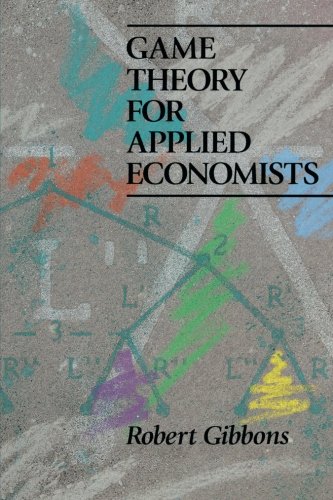-Titulo Original : Game Theory For Applied Economists
-Fabricante :
Princeton University Press
-Descripcion Original:
Review Lucid and detailed introduction to game theory in an explicitly economic context. Cooperative Economic News Service This book introduces one of the most powerful tools of modern economics to a wide audience: those who will later construct or consume game-theoretic models. Robert Gibbons addresses scholars in applied fields within economics who want a serious and thorough discussion of game theory but who may have found other works overly abstract. Gibbons emphasizes the economic applications of the theory at least as much as the pure theory itself; formal arguments about abstract games play a minor role. The applications illustrate the process of model building--of translating an informal description of a multi-person decision situation into a formal game-theoretic problem to be analyzed. Also, the variety of applications shows that similar issues arise in different areas of economics, and that the same game-theoretic tools can be applied in each setting. In order to emphasize the broad potential scope of the theory, conventional applications from industrial organization have been largely replaced by applications from labor, macro, and other applied fields in economics. The book covers four classes of games, and four corresponding notions of equilibrium: static games of complete information and Nash equilibrium, dynamic games of complete information and subgame-perfect Nash equilibrium, static games of incomplete information and Bayesian Nash equilibrium, and dynamic games of incomplete information and perfect Bayesian equilibrium. Excerpt. © Reprinted by permission. All rights reserved. Game Theory for Applied EconomistsBy Robert GibbonsPrinceton University PressCopyright © 1992 Princeton University PressAll right reserved.ISBN: 978-0-691-00395-5Contents1 Static Games of Complete Information.................................................11.1 Basic Theory: Normal-Form Games and Nash Equilibrium...............................21.1.A Normal-Form Representation of Games..............................................21.1.B Iterated Elimination of Strictly Dominated Strategies............................41.1.C Motivation and Definition of Nash Equilibrium....................................81.2 Applications.......................................................................141.2.A Cournot Model of Duopoly.........................................................141.2.B Bertrand Model of Duopoly........................................................211.2.C Final-Offer Arbitration..........................................................221.2.D The Problem of the Commons.......................................................271.3 Advanced Theory: Mixed Strategies and Existence of Equilibrium.....................291.3.A Mixed Strategies.................................................................291.3.B Existence of Nash Equilibrium....................................................331.4 Further Reading....................................................................481.5 Problems...........................................................................481.6 References.........................................................................512 Dynamic Games of Complete Information................................................552.1 Dynamic Games of Complete and Perfect Information..................................572.1.A Theory: Backwards Induction......................................................572.1.B Stackelberg Model of Duopoly.....................................................612.1.C Wages and Employment in a Unionized Firm.........................................642.1.D Sequential Bargaining............................................................682.2 Two-Stage Games of Complete but Imperfect Information..............................712.2.A Theory: Subgame Perfection.......................................................712.2.B Bank Runs.............
-Fabricante :
Princeton University Press
-Descripcion Original:
Review Lucid and detailed introduction to game theory in an explicitly economic context. Cooperative Economic News Service This book introduces one of the most powerful tools of modern economics to a wide audience: those who will later construct or consume game-theoretic models. Robert Gibbons addresses scholars in applied fields within economics who want a serious and thorough discussion of game theory but who may have found other works overly abstract. Gibbons emphasizes the economic applications of the theory at least as much as the pure theory itself; formal arguments about abstract games play a minor role. The applications illustrate the process of model building--of translating an informal description of a multi-person decision situation into a formal game-theoretic problem to be analyzed. Also, the variety of applications shows that similar issues arise in different areas of economics, and that the same game-theoretic tools can be applied in each setting. In order to emphasize the broad potential scope of the theory, conventional applications from industrial organization have been largely replaced by applications from labor, macro, and other applied fields in economics. The book covers four classes of games, and four corresponding notions of equilibrium: static games of complete information and Nash equilibrium, dynamic games of complete information and subgame-perfect Nash equilibrium, static games of incomplete information and Bayesian Nash equilibrium, and dynamic games of incomplete information and perfect Bayesian equilibrium. Excerpt. © Reprinted by permission. All rights reserved. Game Theory for Applied EconomistsBy Robert GibbonsPrinceton University PressCopyright © 1992 Princeton University PressAll right reserved.ISBN: 978-0-691-00395-5Contents1 Static Games of Complete Information.................................................11.1 Basic Theory: Normal-Form Games and Nash Equilibrium...............................21.1.A Normal-Form Representation of Games..............................................21.1.B Iterated Elimination of Strictly Dominated Strategies............................41.1.C Motivation and Definition of Nash Equilibrium....................................81.2 Applications.......................................................................141.2.A Cournot Model of Duopoly.........................................................141.2.B Bertrand Model of Duopoly........................................................211.2.C Final-Offer Arbitration..........................................................221.2.D The Problem of the Commons.......................................................271.3 Advanced Theory: Mixed Strategies and Existence of Equilibrium.....................291.3.A Mixed Strategies.................................................................291.3.B Existence of Nash Equilibrium....................................................331.4 Further Reading....................................................................481.5 Problems...........................................................................481.6 References.........................................................................512 Dynamic Games of Complete Information................................................552.1 Dynamic Games of Complete and Perfect Information..................................572.1.A Theory: Backwards Induction......................................................572.1.B Stackelberg Model of Duopoly.....................................................612.1.C Wages and Employment in a Unionized Firm.........................................642.1.D Sequential Bargaining............................................................682.2 Two-Stage Games of Complete but Imperfect Information..............................712.2.A Theory: Subgame Perfection.......................................................712.2.B Bank Runs.............









